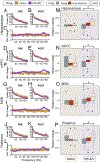Frequency-specific medial septal nucleus deep brain stimulation improves spatial memory in MK-801-treated male rats
- PMID: 35584727
- PMCID: PMC9343054
- DOI: 10.1016/j.nbd.2022.105756
Frequency-specific medial septal nucleus deep brain stimulation improves spatial memory in MK-801-treated male rats
Abstract
Background: Few treatments exist for the cognitive symptoms of schizophrenia. Pharmacological agents resulting in glutamate N-methyl-d-aspartate (NMDA) receptor hypofunction, such as MK-801, mimic many of these symptoms and disrupt neural activity. Recent evidence suggests that deep brain stimulation (DBS) of the medial septal nucleus (MSN) can modulate medial prefrontal cortex (mPFC) and hippocampal activity and improve spatial memory.
Objective: Here, we examine the effects of acute MK-801 administration on oscillatory activity within the septohippocampal circuit and behavior. We also evaluate the potential for MSN stimulation to improve cognitive behavioral measures following MK-801 administration.
Methods: 59 Sprague Dawley male rats received either acute intraperitoneal (IP) saline vehicle injections or MK-801 (0.1 mg/kg). Theta (5-12 Hz), low gamma (30-50 Hz) and high frequency oscillatory (HFO) power were analyzed in the mPFC, MSN, thalamus and hippocampus. Rats underwent MSN theta (7.7 Hz), gamma (100 Hz) or no stimulation during behavioral tasks (Novel object recognition (NOR), elevated plus maze, Barnes maze (BM)).
Results: Injection of MK-801 resulted in frequency-specific changes in oscillatory activity, decreasing theta while increasing HFO power. Theta, but not gamma, stimulation enhanced the anxiolytic effects of MK-801 on the elevated plus maze. While MK-801 treated rats exhibited spatial memory deficits on the Barnes maze, those that also received MSN theta, but not gamma, stimulation found the escape hole sooner.
Conclusions: These findings demonstrate that acute MK-801 administration leads to altered neural activity in the septohippocampal circuit and impaired spatial memory. Further, these findings suggest that MSN theta-frequency stimulation improves specific spatial memory deficits and may be a possible treatment for cognitive impairments caused by NMDA hypofunction.
Keywords: Deep brain stimulation; Gamma; Hippocampus; MK-801; Medial septal nucleus; Spatial working memory; theta.
Published by Elsevier Inc.
Conflict of interest statement
Author disclosure statement
No competing financial interests exist.
Figures






References
-
- Barnes CA, 1979a. Memory deficits associated with senescence: a neurophysiological and behavioral study in the rat. J. Comp. Physiol. Psychol 93, 74–104. - PubMed
-
- Barnes CA, 1979b. Memory deficits associated with senescence: a neurophysiological and behavioral study in the rat. J. Comp. Physiol. Psychol 93, 74–104. - PubMed
Publication types
MeSH terms
Substances
Grants and funding
LinkOut - more resources
Full Text Sources
Research Materials
Miscellaneous

